Authors, publishers and readers love series – authors because it’s easier to write each new book in the same world as the first one, publishers because it’s much easier and more profitable to market and sell a sequel to a successful book than a standalone, and readers because if they discover a series they like, they will read them all. Each new book feels like a homecoming. But as an indie author, how do you know when to call a halt to a successful series and move on? Debbie Young, who has just completed her seven-book Sophie Sayers Village Mystery series, gleans top tips on finishing a series from ALLi author members.
Finishing a Series

Author Debbie Young
Debbie Young is the author of two series of cozy mystery novels, each with a book shortlisted for The UK Selfies Awards. She also writes short stories, guidebooks for authors. articles for writing magazines and blogs, and humorous columns for magazines that serve the local community in the Cotswolds, where she founded and directs the Hawkesbury Upton Literature Festival. Find out more about Debbie on her website www.authordebbieyoung.com and Twitter @DebbieYoungBN.
“If in 100 years I am only known as the man who invented Sherlock Holmes, then I will have considered my life a failure.” – Sir Arthur Conan Doyle.
Doyle epitomises the fear that authors who successfully create a series of novels will for the rest of their life be in thrall to their main characters.
It’s a tough decision to end a series, especially when it’s selling well, with a healthy read-through of readers hooked from the first book. Feeling a little emotional while writing what I had always intended to be the final book in a seven-book series, I asked my fellow ALLis—who had completed series—whether they felt the same.
Says Jane Steen, author of the four-book House of Closed Doors series,
“I often feel that authors are forced by their publishers to keep writing books in series they’re tired of. It’s easy cash, but I far prefer closed-end series as a reader. If I feel like the author is just writing more books because their publisher is waving dollar signs at them, I usually stop reading the series.”
Jean Gill agrees:
“I was really annoyed with George R R Martin’s never-ending series, so I made a conscious decision with my Song at Dawn historical fiction series that it would be a quartet. I told my readers it would be four books, so I stuck to that.”
Indie Authors Call the Shots on Series Length
Fortunately, as indie authors, we get to choose how long our series should be. If you don’t want to stop, you don’t have to. “I have no plan to stop writing my Thomas Berrington series, and I envisage at least 20 more,” says David Penny.

Dawn Brookes agrees: “With book 8 just released and book 9 in the pipeline, I’ve not finished my series yet, because I’m still enjoying writing it. When either my MC or I tire of it, I’ll end it and probably cry!”
How Do You Know When to End a Series?
Usually it becomes clear when a series as run its course, as Kassandra Lamb explains.
“When the characters have overcome their initial flaws/neuroses and there’s not much room for them to grow or change, then it’s time to wind things down.”
If your series is more episodic, with static characters but different adventures each time, running out of ideas for new escapades is the sign that it’s run its course. Which may not necessarily be at the moment you planned or expected to end your series.
Not everyone who starts writing a series knows exactly how many books it will include. Indeed it’s not uncommon for standalones to turn into series, as Clare Flynn describes:
“I have now three series and never set out for any of them to be that. I thought I’d written standalones with a slightly open ending, to leave the reader to wonder what might come next. But I discovered (unlike me) most readers don’t want to wonder, they want to KNOW! So I wrote another and another.”
Alison Morton started out planning to write one novel and ended up writing six novels and two novellas in her alternate history series before starting a new series of contemporary thrillers, as she explains:
“I planned one book, but had far too much story, so went back and wrote the ‘origin’ book, Inceptio. I alread had the first draft of the second, Perfiditas, completed. I then wanted to take the characters to a concluding point that would complete the arc. All books were dips into the continuum of the characters’ lives. Aurelia was going to be a single companion book to the trilogy, a sort of prequel, then I had too much story for that, which resulted in two more books, Insurrectio and Retalio. So that was two trilogies. End of. Then everybody seemed to be writing novellas so I gave it a go and slipped Carina in between Inceptio and Perfiditas. Then I thought I’d better balance out Aurelia’s trilogy with a novella which resulted in Nexus. Thank the gods for spreadsheets to keep the overall arc straight!” Phew!
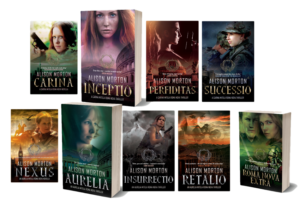
Not Ready to Finish Your Series?
Sometimes authors have second thoughts about ending series. Helena Halme gave her trilogy a reprieve: “After completing my five-book Nordic Heart series, I felt bereft! It has quite a dramatic last book, and several readers asked for more, so I decided to give the characters a a happier ending with a seasonal novella, The Christmas Heart.”
JJ Marsh originally had a smaller series in mind. “I’d planned six, but started to find my audience towards the sixth book, so I changed my mind and wrote another six. Books 1-6 were based on the main character’s arc, but then other characters grew arcs, and I found I had a rainbow.” What a lovely concept!
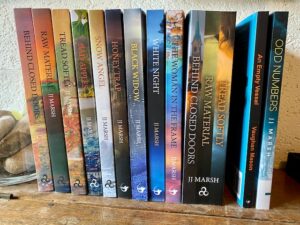
Serene Conneeley said,
“I was a little sad to say goodbye to my main character in my Mists Trilogy, but also happy that I’d left them in a happier place than where they started. Then my hubby said he was sure her best friend had a story and a reason for some of her actions, so I said I’d write him a “little” Rhiannon book – which turned into its own trilogy (Into the Storm) of even longer books! Since then I’ve been writing some standalone novels which I’ve really enjoyed – nice to complete a whole story arc in one book and also to be in a new world.”
Standing Firm
When you have decided that the time has come to end your series, you need to prepare yourself for a such a sense of bereavement.
Writing the seventh in a seven-book series, Susan Grossey says:
“I am wondering whether my uncharacteristically slow progress is due in part to reluctance to let go. My husband has suggested that I can do spin-off series – young Plank, Wilson goes his own way, etc – but I am sad at the prospect of saying farewell to a series that has occupied my mind for a decade. And what will I do with all the research I have done into the time period? This is where I find my cunning plan, which is to do another series, set in the same era, but located in Cambridge, my hometown, where on-the-spot research is cheaper in normal times and easier in Covid times.”

“I feel something akin to post-partum depression or maybe empty nest syndrome,” says Elizabeth Bell. “After completing an epic four-part series of more than half a million words, I’m not ready to lose characters that have been with me since I was 14 years old, but their arcs are complete, so I know I’ll be rereading my books!”
“It’s very much a feeling of loss,” says AD Starrling, who has completed four series under two names and is now working on two more. “It’s akin to saying goodbye to a family you’ve become close to and whose successes and failures you’ve participated in at first hand. It takes a while for that feeling to go away, so I normally start plotting my next project within a week of finishing a series, to get my head out of that empty space and into one of creativity again.”
Eliza Green concurs: “Coming to the end of two series this year is hard, because I love the characters, but they’ve stopped speaking to me. It’s better to get yourself into a new headspace and get excited about something new. It lessens the blow.”
Make Way for New Opportunities
On a more positive note, ending series allows the author to embrace fresh challenges. Even the creators of the most successful series characters of all time – arguably Sherlock Holmes, Hercule Poirot and Miss Marple – found time and space to write about other worlds. Doyle wrote other fiction, non-fiction and poetry, while Agatha Christe wrote six novels about “crimes of the heart” under the pen-name Mary Westmacott. As Doyle and Christie were well aware, we do not exist only to serve our readers – or to pay our mortgages and household bills – but also to grow as writers.
Kay Seeley describes her own experience:
“I usually feel sad when I finish a book and leave my characters behind, but finishing this series, the sadness is tinged with relief that I’ve done it and anticipation knowing I can do something different now. I did love my characters, but their story has been told. Time now to move on to pastures new.”
Nicola Horton will not be entirely sad to finish writing the fourth of her four-book Diary of a Stressed-Out Mother series. She says, “There’s always a nagging feeling that you have to make the next one as good or better, which is a bit stressful. You also have to watch that the stories don’t become tired or repetitive.” She’s started work on a new stand-alone novel at the same time to keep her fresh.
AA Abbott was positively relieved to write the last of her Trail series of thrillers about a vodka heiress, because finally she would have time to write the dark psychological thriller that she’d been wanting to write for a long time. “I breathed a sigh of relief!” she says.
Tiara King also embraced ending her series as the start of something new. “I was ecstatically happy to end my adult fiction family saga. When I knew I was wrapping it up, a weight lifted from my shoulders, and ideas for new standalones hit me like a ten-tonne brick. Now I’m ready for new novels.”
Kristina Adams was also ready to move on, although “it felt very anticlimactic. My What Happens in series was nine years in the making, so to say goodbye to those characters felt strange.”
Gain Confidence from Completing a Series
Another benefit of completing a series is the confidence that comes with having achieved your goal and the motivation to emulate your past success with new books and series.
“Looking back after having started a new series, I realised that the final book in my Park Trilogy, Angel Park, was some of my best writing ever, especially the ending,” says C J Booth. “I use that achievement as a benchmark to try to surpass as I soldier on. I am four books into the second series and know how the eighth and final will end. Confidence came from successfully bringing the first series to a close.”
Always Leave them Wanting More
Of course, it’s possible to leave the door open and return to a series later should you wish to, and Diane Capri suggests that you avoid labelling a series complete, even if you think it is. “I have three series that feel done to me, and I have no plans to write more books in them. But I have never announced that they are finished, just in case I want to write more at some point.”
Keep a Series Fresh by Diversifying
If you find yourself flagging mid-series, diversifying onto other projects can help keep your series fresh and stop you getting bored. (And if you’re bored with your book, your readers will be too.)
“Sometimes you need a break from the same characters,” says David Penny. “So now I have started a new series to get a break. By juggling two or more series, each one will stay fresh. There might even be more side projects to come.”
That approach works for me too. Much as I love the characters in my Sophie Sayers Village Mystery series, I was feeling a little stale after publishing book 5, so I allowed myself to take time out to write a new series that had been in my mind for some time, the St Bride’s School series. And a third, as after the sixth Sophie Sayers book I began a series of related novellas, the Tales from Wendlebury Barrow. The downside? I now have three series each crying out for its next book, and now I feel like a juggler!
Captializing on Completed Series
If the first book of a planned series has been well received, it’s worth completing the series as fast as you can without compromising on quality. “It definitely helps with sales as some people refuse to buy any books until the series is complete,” advises Serene Coneeley.
Capitalise on the intellectual property that you have within your completed series by producing it in every format you can think. Besides the obvious paperback, ebook and audio, hardcover, large print and special commemorative editions will help you generate extra revenue even if you never write another word.
One of the most cost-effective things I’ve done in my self-publishing career is to issue two three-book box sets of the ebooks of the first six in my Sophie Sayers series, on the recommendation of JJ Marsh, who has found great success with collections (as Amazon would like us now to call them) of her 12 Beatrice Stubbs thrillers. Priced right, box sets help readers who come late to your series to catch up at a slightly reduced price. They also they appeal to a particular subset of readers who just love boxsets so much that they buy them in preference to single books. It’s not just about the price point: it’s the bookish equivalent of binge-viewing series on Netflix.
An established series with a good sales record and great reviews will also make your series an attractive proposition for rights sales: translations, film, TV and even merchandise. (Read ALLi’s Guidebook on How to Sell Rights for more guidance on that score.)
Spin-Offs for Extra Income
Spin-offs are also a great idea. “You can always write some short stories or novellas about the characters if you want to revisit them,” suggests Jane Steen. “Take a secondary character and write a back story or even a serial.”
“I will allow myself to write a novella if I am missing the characters from a series too much,” says Kassandra Lamb.
In parallel with my seven-book Sophie Sayers series, I’ve started a quick-read (and quick-to-write) novelette series, Tales from Wendlebury Barrow, each story 20-25% the length of a novel, to keep my characters alive, as well as using up some story ideas not sufficiently complex for a novel. I’m also planning a Christmas special collection of short stories and a novel about a Sophie Sayers Village Mystery character so minor that she’s dead before the first novel begins! You don’t have to write your stories in chronological order: think prequels as well as sequels.
Another further income stream might come from creating a series companion or reader guide, a directory of all the characters and settings, for die-hard fans, such as Alison Morton’s Official Roma Nova Reading Guide. Alternatively such guides might be used as mailing list magnets.
Carrying Series Readers With You
If you’re nervous of leaving your established readership from your completed series behind, try introducing some crossover between your old series and your new to carry readers with you. I set my St Bride’s series just down the road from Sophie Sayers’ home village of Wendlebury Barrow, mentioned it in my mailing list magnet, which is a Sophie Sayers novelette, and its protagonist, Gemma Lamb, befriends Sophie and meets her in each St Bride’s adventure.
Clearly that’s more difficult if your subsequent series are in a different genre, but you may find another way of linking them. Sara Rosett took an interesting approach by creating a new series for the village setting she wrote about in a contemporary cosy mystery series, this time set in the 1920s.
Happy Ever After?
And now it’s time for a confession: due to reader demand, I’m now planning an eighth novel in my seven-book Sophie Sayers series. With two other series and some standalones under way, book 8 will have to wait its turn to be written, but neither Sophie nor I have run out of steam just yet. Thanks to Daryl Potter for reminding me of the late, great Douglas Adams’ announcement of “the fifth book in the increasingly inaccurately named Hitchhiker’s Guide to the Galaxy Trilogy.” I’m in good company.
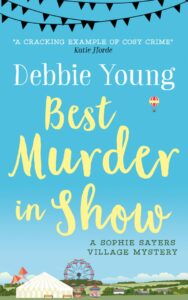
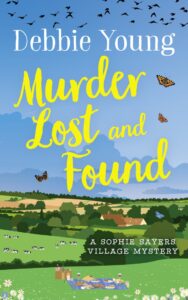

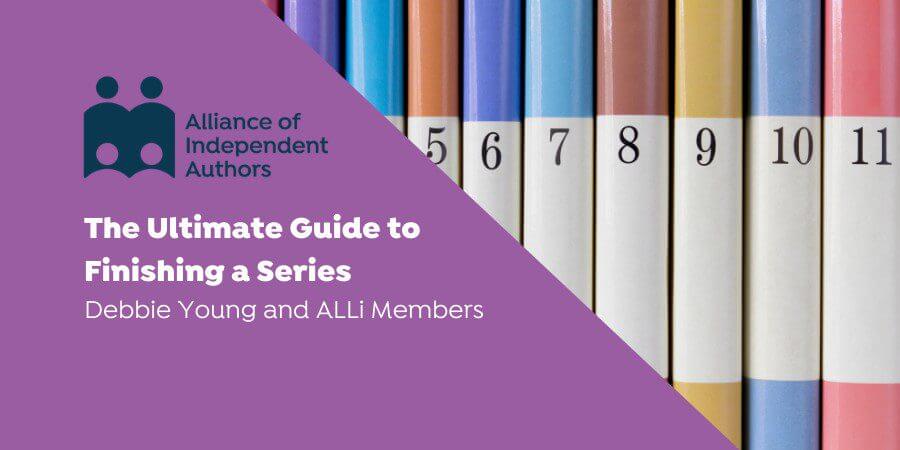



I’m also writing my first series, everything was easy at first, but I’m feeling more and more exhausted as the characters become more numerous and it’s difficult to convey details and plot. Your article is really helpful
Hi did you guys read my book. 365 a book of poerry? Im having a hard time getting sales figures. Any hope to hear from you.
Thanks for including my thoughts in this great post! I would add another.
Start a new series while you are winding down an existing one. One, it maintains reader interest, and two, it makes it a bit easier to let go of the characters from the former series.
I am now starting my third series, as I’m winding down my second, and my excitement over the new series is helping to offset my grief.